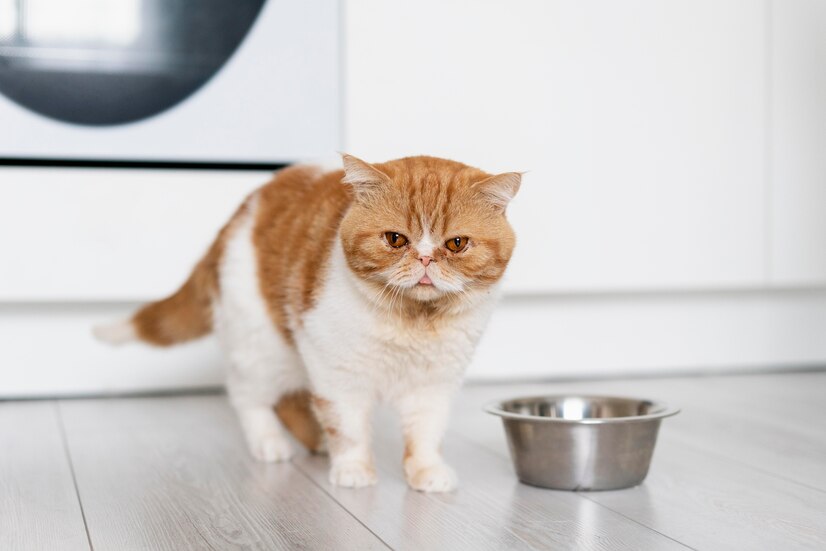When you eat yogurt, do you know which benefits you’re getting? You’ll be happy to know that it has a lot of benefits, such as strengthening your bones no matter your age, reducing appetite and hunger levels, boosting your metabolism, improving gut health, making you mentally strong, building muscle mass, improving digestion, and many more!
But when we look at our feline friends, we might immediately wonder, “Can cats eat yogurt?” What if I give my cat a little bit of yogurt? Will it hurt them, or will it make them healthier? In this discussion, we will explore the relationship between cats and yogurt.
Which human foods or fruits have you given your cat first, and what was the result? Let us know in the comment section!
Can Cats Eat Yogurt?
Yes, cats can eat yogurt, but three conditions must be met: it should be given in moderation, it should be plain, and it must be unsweetened. Cats are carnivores, and their stomachs are best suited for meat, such as chicken, fish, and beef.
Human foods should always be offered as occasional treats to encourage your cat’s food intake and hydration.
Note: Consult with your vet before offering yogurt. They can advise you on the appropriate amount based on your cat’s age and breed needs.
Lactose Intolerance in Cats
Most of our cats are lactose intolerant, which can complicate their relationship with dairy products like yogurt. But what exactly is lactose intolerance? Essentially, it’s an inability to properly digest lactose, the sugar found in yogurt and other dairy products. Read Also Kidney Disease in Cats: Early Signs You Shouldn’t Ignore
This intolerance occurs when a cat’s body doesn’t produce enough of an enzyme called lactase, which is needed to break down lactose. Interestingly, about half of adult cats are lactose intolerant. While they might have been able to digest dairy as kittens, this ability often diminishes as they grow older. Read Stages Of Kidney Disease In Cats
When a lactose-intolerant cat ingests dairy like yogurt, it can lead to unpleasant digestive problems such as diarrhea or vomiting. Therefore, despite yogurt’s high protein and fat content, feeding it to a lactose-intolerant cat could cause more harm than good. Read Can Cats Eat Cheese?
Can Kittens Eat Yogurt?
Ask yourself this question: “Would you feed fast food to a one-year-old baby?” The answer is likely no because a baby’s stomach can’t handle it. The situation is the same for kittens. Their stomachs are only equipped to digest their mother’s milk, which should be their primary food source—not human foods like yogurt. Read Can Cats Eat Onions? A Deadly Threat
Avoid the mistake of giving yogurt to your kittens. Stick to their mother’s milk or kitten-specific commercial milk for their nutrition. Read Can Cats Eat Bananas?
Can cats eat Greek yogurt?
Yes, cats can eat Greek yogurt in moderation, but it’s important to note that if your cat is lactose intolerant, you should avoid giving it to them. Also, steer clear of flavored Greek yogurt, as added sugars and artificial sweeteners can be harmful to cats. Overfeeding yogurt can lead to digestive problems, so it’s best to keep portions small. Read Can Cats Eat Chocolate?
Why are cats attracted to yogurt?
Cats have a much stronger sense of smell than humans—some say it’s 13 times better, while others believe it’s 14 times better. Either way, they are way ahead of us when it comes to detecting scents. Dairy products aren’t always safe for cats, but there are certain ingredients like proteins and fats that attract them. If your cat likes yogurt, it doesn’t mean you should start feeding it to them regularly. Why Does My Cat Follow Me To The Bathroom
Pros and Cons of Feeding Yogurt to Cats
Yogurt can provide some benefits to cats due to its protein, vitamins, and minerals. Protein is crucial for cats, who need a high-protein diet as obligate carnivores. Yogurt offers a modest amount of protein, which can give a slight boost, though it’s not a substitute for their main protein sources like meat and fish. Besides protein, yogurt is rich in calcium, magnesium, vitamins B2 and B12, and potassium, which support strong bones, teeth, and muscles. Read more about the topic here
Another advantage is that yogurt contains probiotics, the healthy bacteria that can help with digestion. Probiotics might alleviate symptoms like gas, stomach cramps, and diarrhea, and they may also contribute to dental health and help with hairballs.
Read Also
However, there are some drawbacks to consider. The safe amount of yogurt for cats is minimal—around a teaspoon—so the nutritional benefits are minimal. Cats generally receive all the essential nutrients they need from a high-quality, balanced cat food, making yogurt an unnecessary supplement. Additionally, while yogurt contains probiotics, it’s not the most effective way to address digestive issues. For cats needing probiotics, a vet-recommended, cat-specific supplement is a more suitable option. Read Can Cats Drink Milk?
Safe yogurt alternatives for cats
There are a lot of safe options you can provide your cat instead of yogurt, such as:
- Probiotic supplements for cats
- Specially formulated cat foods with probiotics
- Bone broth
- Canned pumpkin (plain, unsweetened)
- Digestive enzyme supplements
- Prebiotic supplements
- Fermented fish products
How to Feed Yogurt to Your Cat
To offer your cat yogurt, choose a plain, unsweetened variety like Greek yogurt and avoid those with added sugars or chocolate, which can be harmful. Always check for toxic ingredients like xylitol, and consult your vet before giving any human food to your cat. Offer only a teaspoon to see if they like it, and remember to keep treats to no more than 10% of their daily calorie intake.
Read Our Next Articles
Can Cats Eat Carrots?
Can Cats Eat Kale? Is Kale Safe for Cats?
Can Cats Eat Peas?
Can Cats Eat Garlic? The Risks You Need to Know



